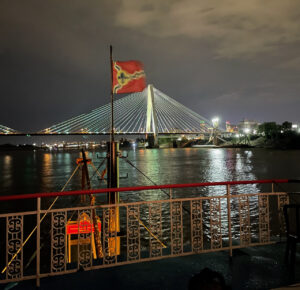
Looking south, from the deck of the ‘Becky Thatcher,’ to the Stan Musial Veterans Memorial Bridge
My original sense of place, represented graphically, might look like a drawing a child colors with a crayon: back and forth, tongue-out determined, empty spaces between the lines. This was how I learned my childhood house, my hometown and region, as I traced the same paths over and over. Later I moved to other places—Kentucky, the Florida Panhandle, Virginia, the Republic of Panama, Chicago, Miami, central Illinois, Louisiana—but came to know them in the same way: by determined habit over time and by wandering outside the lines.
Last week my family went on a dinner cruise on the Mississippi River. As soon as I boarded the replica paddle wheeler and saw the wooden floorboards in the saloon, I felt sure I had been on the boat, named the Becky Thatcher, as a kid. Back then there was more than one actual paddle wheeler tied up on the landing at St. Louis, as well as two replicas, an old warship, a floating restaurant or two, and the Admiral, an enormous art deco steamer made from a rail ferry that first ran in 1907. The Admiral had side wheels and a deep-breathing, long-stroke engine that exhaled through its stacks like the devil out for a run, and a calliope that played madly. The stern-wheeler I seem to remember may also have been a Becky Thatcher; the wooden planks on its wheel slapped and grabbed the water, making the ride jerkier than you would imagine as it surged, surged, surged, surged, even headed downstream, when it needed to outpace the current to maintain steerage.
A river, time, and money must flow, and they all had their way with the vessels. The USS Inaugural is a hulk in the mud downstream from the Arch now, after breaking loose in the flood of 1993, along with a floating Burger King that clipped a bridge and sank. The Admiral was costly to maintain, was involved in a barge accident, and was finally scrapped in 2011, which I think the city will come to regret as it makes plans to expand recreational use of the river. The genuine steamboat Becky Thatcher was sold upriver in Ohio, eventually sunk, and was scrapped.
But the replica Becky Thatcher and her sister boat Tom Sawyer also have been giving rides since the Arch was under construction in 1964. They have diesel engines and screws, which make the ride smoother, if a bit smellier. The Becky Thatcher has two saloons, or enclosed dining decks, with tables and chairs jammed in around the wooden passage that gets used, after several Bud Lights, as a dance floor. Windows all around give a good view of the shorelines, which are still mostly industrial. On top is a roofless promenade deck to look down on the river and at the skyline of the city.
The boat’s captain said a few words about safety before we got underway, but the banjo player mostly seemed to be in charge. He was accompanied by an electric bass player who used a filter to make it sound like a tuba. My teen son, who loves Kanye and works part-time at a relatively fine dining establishment, was obligated by contract to pull faces of comic disbelief at the hokeyness of it all—the replica boat with its low ceilings sliding around on the brown water; the iceberg salad and cut of meat advertised as a filet with seemingly jarred gravy; the mix of banjo music and diners singing along to everything from Beatles to something approaching “Camptown Races.”
But this day the river was more placid than a lake, with the lights of the city, its bridges, and the casino and mills on the Illinois bank, reflected in it. The musicians had so many requests they could not do them all but worked in two rounds of happy birthdays anyway. Crew and servers danced without irony. We ran up to the shoal at Chain of Rocks and drifted back. It was a gentle, genuine, boring good time, what entertainment used to be and likely will be again when some future calamity keeps most of us from traveling very far or doing anything too complicated. My son and I agreed on the drive home we had experienced a rare and valuable thing—an old-timey amusement that had not been disneyfied.
In recent years I have gotten a sense of distant places by a process that feels more like long lobs on a tennis court: floating over some boundary, a skipping-squeaking landing, hanging there briefly, then the jarring return. That is more modern than the coloring-book way of coming to know, which is very nineteenth century but allows depths of understanding.
